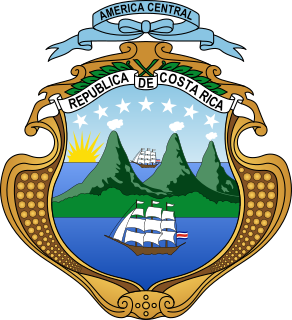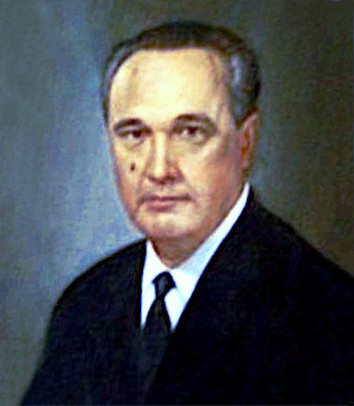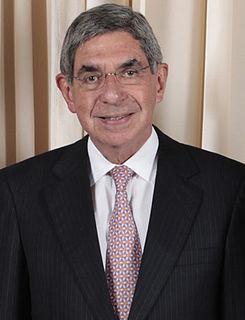| |||||||||||||||||||||||||||||||||
| |||||||||||||||||||||||||||||||||
Provinces won by Rodriguez in blue, Corrales in green | |||||||||||||||||||||||||||||||||
| |||||||||||||||||||||||||||||||||
 |
|---|
| This article is part of a series on the politics and government of Costa Rica |
Legislature |
|
General elections were held in Costa Rica on 1 February 1998. [2] Miguel Ángel Rodríguez of the Social Christian Unity Party won the presidential election, whilst his party also won the parliamentary election. Voter turnout was 70%, the lowest since the 1950s. [3]

Costa Rica, officially the Republic of Costa Rica, is a country in Central America, bordered by Nicaragua to the north, the Caribbean Sea to the northeast, Panama to the southeast, the Pacific Ocean to the southwest, and Ecuador to the south of Cocos Island. It has a population of around 5 million in a land area of 51,060 square kilometers. An estimated 333,980 people live in the capital and largest city, San José with around 2 million people in the surrounding metropolitan area.

Miguel Ángel Rodríguez Echeverría is a Costa Rican economist, lawyer, businessman and politician. He served as President of Costa Rica from 1998 to 2002, and was briefly Secretary General of the Organization of American States (OAS) in 2004, before stepping down and returning to his country to face allegations of financial wrongdoing during his presidential tenure in Costa Rica. On 27 April 2011 he was sentenced to 5 years in prison for corruption.

The Social Christian Unity Party is a centre-right political party in Costa Rica.
Contents
An economic recession, a teachers' strike due to a pensions' reform and some corruption scandals made President José María Figueres' government highly unpopular. Thus, officialist candidate José Miguel Corrales tried to distance himself from Figueres as much as possible. Corrales won over former President of Congress Jorge Walter Coto Molina in PLN's primaries but the discovery of Voter fraud damaged PLN's image and split the party. [4] On the contrary in PUSC, previous candidate Miguel Ángel Rodríguez was seen as the natural nominee for this election, and despite the fact that deputy Luis Fishman was rumored as a possible internal opponent, he finally declined and Rodríguez was nominated without the need of primaries, thus keeping the party united. During Figueres' administration the so call Figueres-Calderón Pact was signed between the leaders of the two main parties (and sons of the two caudillos of the 1948 civil war); him and Rafael Ángel Calderón Fournier (Rodríguez political rival) to approve several mutually beneficial laws for both major parties, something that caused outrage among large segments of the population and started the downfall of the two-party system. [5]

The President of Costa Rica is the head of state and head of government of Costa Rica. The President is currently elected in direct elections for a period of four years, which is not immediately renewable. Two Vice presidents are elected in the same ticket with the president. The president appoints the Council of Ministers. Due to the abolition of the military of Costa Rica in 1948, the president is not a Commander-in-chief, unlike the norm in most other countries, although the Constitution does describe him as commander in chief of the civil defense public forces.

José María Figueres Olsen is a Costa Rican businessman and politician. After he left the presidency of Costa Rica in 1998, Figueres has also been involved in global issues such as climate change, sustainable development, and technology. He started his career as an engineer working in agribusiness. After a decade, he entered public service as Minister of Foreign Trade and then Minister of Agriculture. In 1994, he was elected President of Costa Rica, as the nation's youngest elected president of the 20th century. In 2000, he joined the World Economic Forum in Switzerland, and later he worked with Concordia 21 in Madrid. Since 2010, he has been Chairman of the Carbon War Room, an independent non-profit organization focused on the global transition to a low-carbon economy. On 27 March 2012, Sir Richard Branson announced that he was appointed as the new President of the Carbon War Room.
The Costa Rican Civil War was the bloodiest event in 20th-century Costa Rican history. It lasted for 44 days, during which approximately 2,000 people are believed to have died. The conflict was precipitated by the vote of the Costa Rican Legislature, dominated by pro-government representatives, to annul the results of the presidential elections held in February, alleging that the triumph of opposition candidate Otilio Ulate had been achieved by fraud.


















